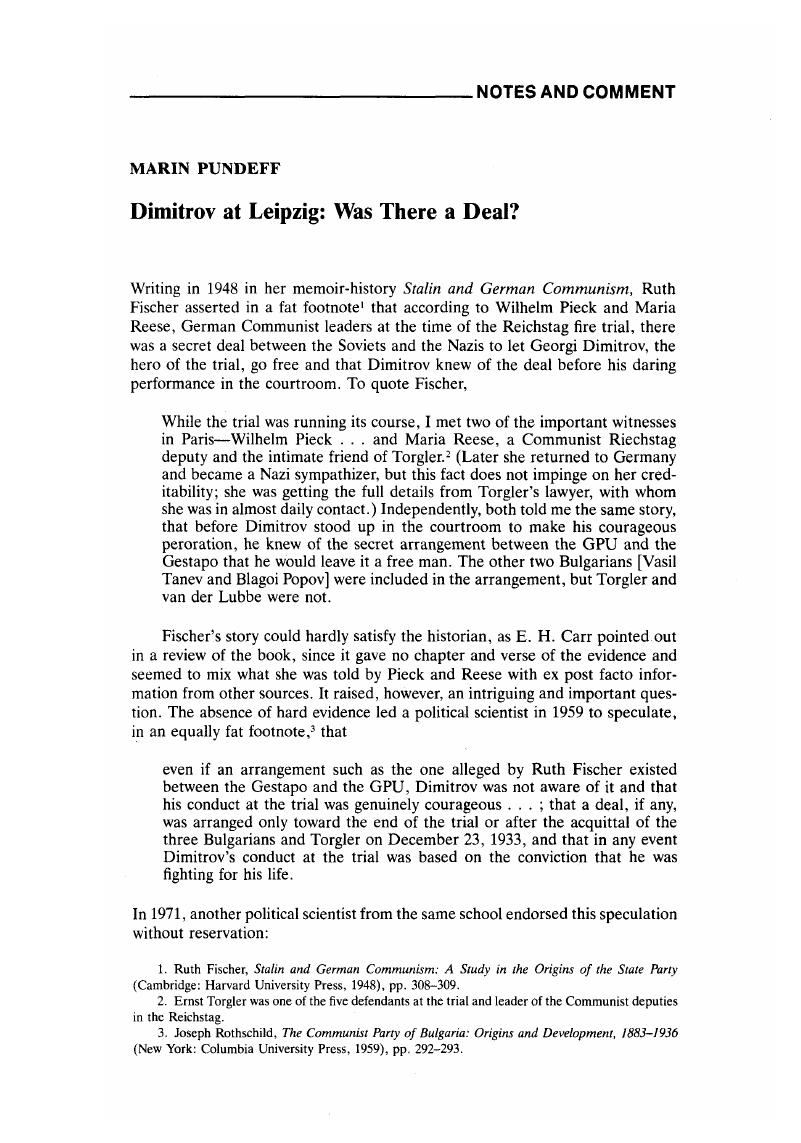No CrossRef data available.
Published online by Cambridge University Press: 27 January 2017

1. Fischer, Ruth, Stalin and German Communism: A Study in the Origins of the State Party (Cambridge: Harvard University Press, 1948, pp. 308–309 CrossRefGoogle Scholar.
2. Ernst Torgler was one of the five defendants at the trial and leader of the Communist deputiesin the Reichstag.
3. Rothschild, Joseph, The Communist Party of Bulgaria: Origins and Development, 1883–1936 (New York: Columbia University Press, 1959, pp. 292–293 Google Scholar.
4. Oren, Nissan, Bulgarian Communism: The Road to Power, 1934–1944 (New York: Columbia University Press, 1971, pp. 69–70 Google Scholar.
5. Spomeni za Georgi Dimitrov, ed. Dobrin Michev et al. (Sofia, 1982) 3: 414; emphasis added.
6. Rothschild, Communist Party of Bulgaria, p. 132.
7. Turok, Vladimir, “Vuv Viena,” Spomeni za Georgi Dimitrov 1: 309–316 Google Scholar. Turok, who becameone of the leading Soviet historians of Austria, was then in Vienna as a student and an operative ofthe Comintern and was appointed Dimitrov's secretary in the Balkan Communist Federation. Inconversations with the author (Budapest, 1972, and Moscow, 1974), he expanded on his work withDimitrov. Another young Soviet functionary who served as Dimitrov's secretary in Moscow wasBoris N. Ponomarev, until recently a candidate member of the Politbureau.
8. Khadzhinikolov, V. et al., Georgi Dimitrov: biografiia (Sofia, 1972), p. 204 Google Scholar.
9. Ibid., pp. 226–228; Savova, E., Georgi Dimitrov: Letopis za zhivota i revoliutsionnata mu deinost (Sofia, 1982), pp. 562–619 Google Scholar, where Dimitrov's territory and activities as VEB chief are detailed;see also the reminiscences of the secretary of VEB, Rikhard Giptner, “Rukovoditel na Zapadnoevropeiskotobiuro na IKKI i general sekretar na Komunisticheskiia Internatsional,” Spomeni za Georgi Dimitrov 1: 353–364.
10. Kolarov, Vasil, “Nasheto putuvane za vtoriia kongres na Kominterna (iuni-iuli 1920 g.),” Spomeni za Georgi Dimitrov 1: 230–246 Google Scholar; B. Bogdanov, “V polza na komunizma,” ibid. 1: 250–251.
11. V Sokolov, V., “Bor'ba Sovetskogo pravitel'stva za osvobozhdenie Bely Kuna iz avstriiskoitiur'my (1920 g.),” Novaia i noveishaia istoriia, no. 6 (1976): 123–133 Google Scholar; Zaitsev, V. S., “Geroi Oktiabriai grazhdanskoi voiny,” Voprosy istorii KPSS, no. 12 (1963): 90–94.Google Scholar
12. Barumova, M., “Zhivot za naroda,” Spomeni za Georgi Dimitrov 1: 19–33 Google Scholar. She and hermother were sought out in Sofia by a Marcel Cordier of the Comintern's office in Paris, who produced, ripping the sole of his shoe, 10, 000 francs for their travel expenses and an address to go to whenthey reached Paris; G. Stankulov, “V podkrepa na svoia sin,” ibid. 2: 125–127.
13. B. Danovski, “Po vremeto na Laiptsigskiia protses,” ibid. 2: 130–139. Two Bulgarian lawyers, Stefan Dechev and Pet “r Grigorov, were also around to provide advice and relay information.Grigorov later emigrated to the United States and became editor of the Bulgarian Communistnewspaper Narodna Volia in Detroit. After the war, he was summoned back to Bulgaria to serve asDimitrov's chief of staff. Significantly, the three-volume collection contains no memoirs by the twolawyers. Grigorov reportedly broke with Dimitrov in 1948.
14. L. Diugmedzhiev, “V zashtita na geroia ot Laiptsig,” ibid. 2: 128–129, quoting the primeminister, Nikola Mushanov.
15. Popov and Tanev, obscure Bulgarian Communists, were included because they, too, hadbeen rejected by the Bulgarian government and it would have been awkward to leave them behindwhile Dimitrov was saved. In the Soviet Union they were held accountable for dissociating themselvesfrom Dimitrov during the trial and appeasing the court to save themselves. Both spent years in theGulag. Popov's fate is better known since he returned to Bulgaria after Stalin's death and was “rehabilitated “; see Grigorov, B., “Blagoi Popov—edin ot podsudimite po Laiptsigskiia protses prez1933 g.,” Isloricheski Pregled, no. 4 (1983): 74–84 Google Scholar. Popov is said to be the author of highly revealingmemoirs, Za da ne se povtori nikoga veche (Paris, 1981), smuggled out of Bulgaria after his deathin 1968.
16. The New York Times, 23 February 1934, p. 8.
17. Sontag, R. J. et al., eds., Documents on German Foreign Policy, 1918–1945, Series C (1933–1937), 6 vols. (Washington: G.P.O., 1959) 2: 35, 40–41Google Scholar.
18. Savova, Georgi Dimitrov, p. 692, quoting archives of the German Socialist Unity party.
19. In Moscow Dimitrov worked on a book about the trial but never finished it; see Spomeni za Georgi Dimitrov 2: 98–105.